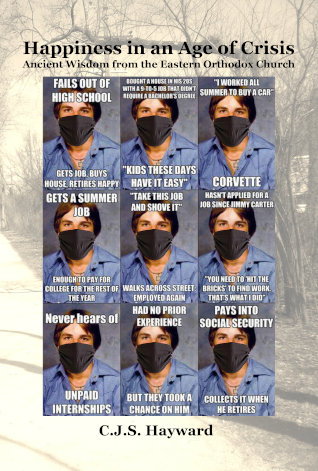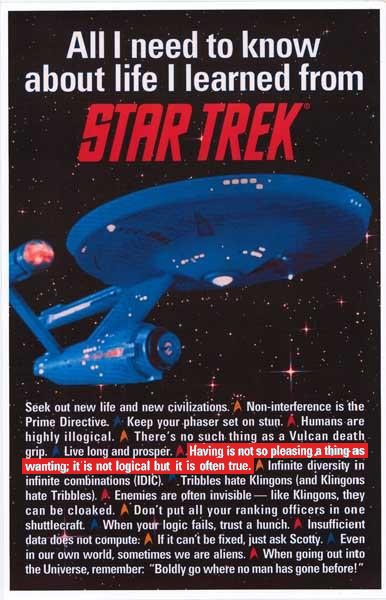In A Pet Owner's Rules, I wrote of God as a Pet Owner who has only two rules: to enjoy freely of the gifts he has given, and "Don't drink out of the toilet." I wrote, "Strange as it may sound, it takes sobriety to enjoy even drunkenness. Drunkenness is drinking out of the toilet... It takes chastity to enjoy even lust... It takes contentment to enjoy even greed... As G.K. Chesterton said, it takes humility to enjoy even pride..."
I would like to zero in on it taking contentment to enjoy even covetousness.
When I was an undergraduate, one of my suitemates had an "I Learned It All From Kindergarten"-style poster, except it was in this case it was "All I Need to Know About Life I Learned from Star Trek," and one of the entries was, "Having is not so pleasing a thing as wanting; it is not logical but it is often true."
Whatever your opinion of Star Trek may be, I regard this specific lesson (which I don't remember meeting in any Star Trek TV show or movie that I've watched), as an unfortunate lesson. Possibly there is more pleasure in starting to covet something than being in contentment before; twentieth century critiques offering conservative warnings about capitalist society where people like corporations because they sell them such desirable and coveted things; advertising perennially creates a spirit of discontent with whatever one has. And here what is a great good appears small and what is small in its merits appears great: the greatness of being content with what you have appears a trivial thing, and the triviality of things that can be acquired by chasing covetousness appears deceptively great.
The Orthodox Church does us a service in exhorting us to be content with what we have. In fact, through the purifying fire of fasting (for instance), the Orthodox Church does us a service by exhorting us to be content with less than what we have.
St. Paul tells us, "Godliness with contentment is great gain... The love of money is the root of all evil." St. John Chrysostom magnifies this good dose of clear thinking, with great beauty and eloquence, about what is real treasure and hollow and what is and is not truly desirable; if you want an entryway into his magnificent collection, one highly recommended work is A Treatise to Prove That Nothing Can Injure the Man Who Does Not Harm Himself, as bringing great clarity about what is truly desirable, and what is truly to be feared.
What did St. Paul have in mind when he called a form of covetousness "the root of all evil?" Let me give one educated guess about two people who coveted more than reigning as lords in Paradise. Adam and Eve did not fall because they ate the fruit of the tree of the knowledge of good and evil; God's Plan A had always been for them to eat that fruit, in the right way, and when they were ready for it. The ban was only meant to be temporary while they grew. Adam and Eve fell because they went behind God's back and had the fruit on their own terms, not God's. And that is why what God intended as a profound blessing was received as the venomous sting of death, that opened the door to every sin, suffering, and sorrow known to man.
Now for this article, I personally find it annoying when other people use a made-up term known only to themselves without explaining what they mean and expect other people to understand them, and here I'm going to do half half better by using some made-up terms, but explain what no standard term I'm aware of meaning. In each case I will explain the term, and I'm sorry if this is confusing. I'll try to be understandable, but here I think new terms will be fruitful.
In my own covetousness I have experienced some future purchase as mediating humanity. What I mean by mediating humanity is that I feel that I will not be full and complete as a human being until I get whatever hot new thing I just can't live without. But whenever I get whatever junk I need to have, it thrills for a short while but the thrill quietly slips away, and I soon finding myself needing some other acquirement to mediate my being fully human. Ick!
When I was getting ready to study theology, I had some money and used it to buy a computer that ended up lasting me for several years: an IBM ThinkPad (a respected brand, for good reason), with 15" of screen real estate, having 1GB RAM and a 1GHz processor. That's still plenty for running Linux, and it was quite respectable for a laptop when I bought it in 2002 and several years after.
When I was working out buying a computer that I would have last me for a long time, I worked out the details of a practical investment, but there was something holding me back. My conscience wasn't quiet. I didn't see why this wouldn't be an optimal solution to a rational problem, but my desire was in part what I call sacramental shopping. Not too far in meaning from mediating humanity, sacramental shopping is an ersatz sacrament, a sacrament made much dumber. Not that we are not to live by consuming: the Holy Mysteries are quite specifically there for us to feed on and live by consuming. But we are missing something if we shop for merchandise to give us life. And, finally, I repented of my seeking sacramental shopping and accepted my conscience's "No," whole cloth. And then my conscience surprised me by changing, and I purchased the computer as a careful investment, but only a rational choice and not sacramental shopping.
Indulging covetousness does not satisfy. It can't. Contentment is what satisfies.
St. Basil said of lust that it is like a dog licking a saw. The dog continues because of the taste, but the taste is of his own blood, of his own woundedness. And so, really is seeking contentment from indulging covetousness. The pleasure is the pleasure of our own woundedness.
But in all this, and in A Pet Owner's Rules, the bit about not drinking out of the toilet is only a footnote to the #1, central rule: "I am your owner. Receive freely of the food and drink I have provided for your good!" We are perhaps content to feed a dog canned or dry pet food and water, but "eye has not seen, ear has not heard, nor has any heart imagined" what the Pet Owner in Heaven has for us, beginning not after the Last Judgment but here and now. I remember a time visiting a monastery where I was bowled over by humility by a layman who was not even a novice, just one of the people who worked in the kitchen, and I came back and wanted to see him, not because he was kind to me (although I assure you that he was very warm and kind), but because I wanted to catch some crumbs from under the table of his humility. My two thoughts were that I had not dreamed there were such things in Heaven or on earth, and a perhaps brash thought, "I want the mint [spiritual money-printing machine]!" because his humility really had reached that degree, and I wanted the source of such money. (Perhaps we are commanded in the Sermon on the Mount, "Do not store up treasures on earth," but that is a #2 helper, a footnote, to "Store up treasures in Heaven," and humility is one such treasure, legitimate to have and legitimate to desire and seek.) And let us ascend!
Again, as we climb higher, we may say this. Sacramental shopping is alchemy made dumber: alchemy—the spiritual tradition of transforming metals and men with a technique that would circumvent the need for a lifetime of hard discipline. Alchemy is much more confusingly similar to Truth than sacramental shopping, but alchemy is sacramental Christianity made dumber. Boethius lamented the person who fathered the practice of adorning with lifeless jewels and gold the human body: the living artwork of God. And what is the transformation into gold, possible or impossible, besides the transformation of bread and wine into the Body and Blood of Christ himself?
And beyond that, we are to heed St. Athanasius that we are not to command the driver's seat for ourselves. Our participation in the Holy Mysteries is to recognize ourselves a partner in a Great Dance where God himself seeks our consent to transform us. All of creation is blessed to follow God's lead, and we humans are blessed to actively participate in our following God's lead. We are not solipsists who on our own are worthy to be transformed by the Body and Blood of Christ. We must not count ourselves worthy of things much lesser: but God laughs and beckons us further up and further in!
And beyond even that, we cannot overreach. Not in anything truly important, that is. We may be forbidden to seek the office or honors of Bishop, Archbishop, Metropolitan, Patriarch, or Pope, but not one of us is forbidden to seek repentance, Heaven's best-kept secret, nor asceticism, nor moral character worthy of such office. Humility, true humility, is a wonder such as we can scarcely even guess; when we meet a truly humble man we may say, "I'd have been a better man all my life if I'd known there were things like this." And in deifying transformation, we cannot pursue too much or too hard. Possibly we can pursue unwisely, as novices who attempt impossible virtues, or monastics who attempt warfare above their strength, but this is not really a matter of wanting too much good for ourselves, but traps beside the way of virtue that miss the mark and seek good in a premature and flawed way. We are summoned perhaps to let go of dust and ashes like coveted silver and gold, but only that we may be made able to grasp Silver beyond silver and Gold beyond gold, the Treasure for Whom every treasure in Heaven and on earth is named. We may be forbidden to seek fame and praise before men: I am perhaps forbidden to seek fame before my fellow laity, or the Readers, or the Subdeacons, or the Deacons, or the Priests and Archpriests, or my Archbishop, or ROCOR's Metropolitan, or the Patriarch of Moscow, but that is only because all of us are summoned to seek fame before God himself, a God who Wonders at our slightest act or thought of good. I may be forbidden to be impressed with myself: but that is so that God may be eternally impressed.
One priest complained that no one ever confessed covetousness. Covetousness is one of many gates of Hell, if indeed Hell has more than one gate. The virtues are one Virtue, and consequently there is really only one vice we need shed. But if we shed covetousness, with it open not only Heavenly contentment, but the gates of Heaven open to live here on earth.
Perhaps some day we may speak of love.


